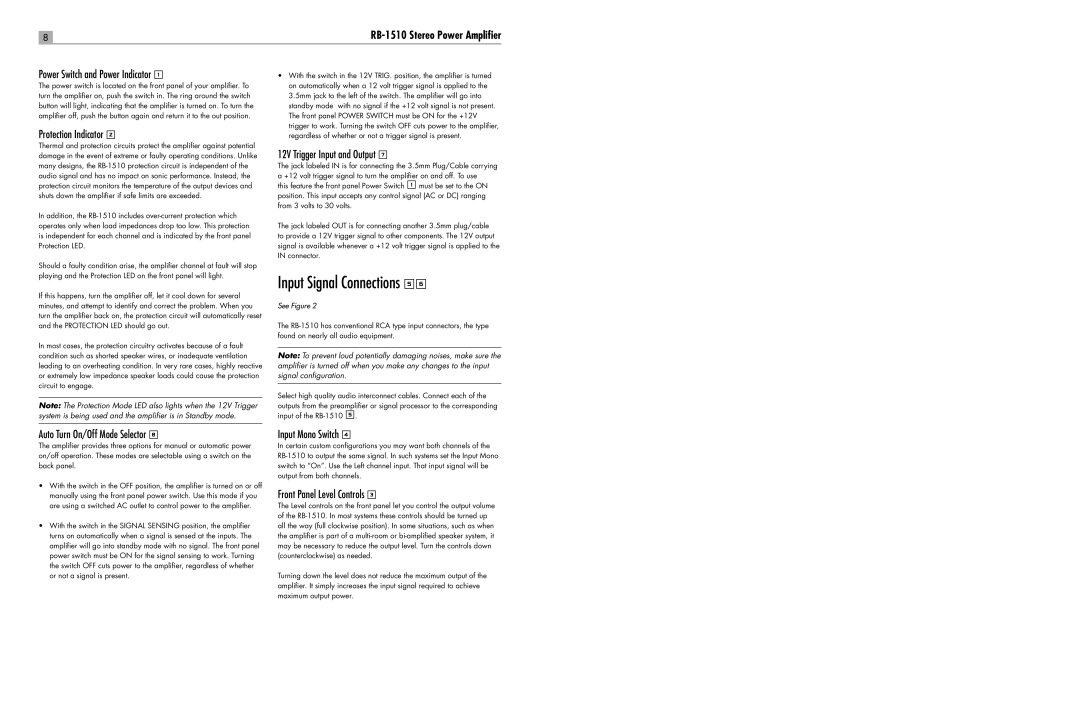
8 |
|
Power Switch and Power Indicator 1
The power switch is located on the front panel of your amplifier. To turn the amplifier on, push the switch in. The ring around the switch button will light, indicating that the amplifier is turned on. To turn the amplifier off, push the button again and return it to the out position.
Protection Indicator 2
Thermal and protection circuits protect the amplifier against potential damage in the event of extreme or faulty operating conditions. Unlike many designs, the
In addition, the
Should a faulty condition arise, the amplifier channel at fault will stop playing and the Protection LED on the front panel will light.
If this happens, turn the amplifier off, let it cool down for several minutes, and attempt to identify and correct the problem. When you turn the amplifier back on, the protection circuit will automatically reset and the PROTECTION LED should go out.
In most cases, the protection circuitry activates because of a fault condition such as shorted speaker wires, or inadequate ventilation leading to an overheating condition. In very rare cases, highly reactive or extremely low impedance speaker loads could cause the protection circuit to engage.
Note: The Protection Mode LED also lights when the 12V Trigger system is being used and the amplifier is in Standby mode.
•With the switch in the 12V TRIG. position, the amplifier is turned on automatically when a 12 volt trigger signal is applied to the 3.5mm jack to the left of the switch. The amplifier will go into standby mode with no signal if the +12 volt signal is not present. The front panel POWER SWITCH must be ON for the +12V trigger to work. Turning the switch OFF cuts power to the amplifier, regardless of whether or not a trigger signal is present.
12V Trigger Input and Output 7
The jack labeled IN is for connecting the 3.5mm Plug/Cable carrying a +12 volt trigger signal to turn the amplifier on and off. To use
this feature the front panel Power Switch 1 must be set to the ON position. This input accepts any control signal (AC or DC) ranging from 3 volts to 30 volts.
The jack labeled OUT is for connecting another 3.5mm plug/cable to provide a 12V trigger signal to other components. The 12V output signal is available whenever a +12 volt trigger signal is applied to the IN connector.
Input Signal Connections 56
See Figure 2
The
Note: To prevent loud potentially damaging noises, make sure the amplifier is turned off when you make any changes to the input signal configuration.
Select high quality audio interconnect cables. Connect each of the outputs from the preamplifier or signal processor to the corresponding input of the
Auto Turn On/Off Mode Selector 8
The amplifier provides three options for manual or automatic power on/off operation. These modes are selectable using a switch on the back panel.
•With the switch in the OFF position, the amplifier is turned on or off manually using the front panel power switch. Use this mode if you are using a switched AC outlet to control power to the amplifier.
•With the switch in the SIGNAL SENSING position, the amplifier turns on automatically when a signal is sensed at the inputs. The amplifier will go into standby mode with no signal. The front panel power switch must be ON for the signal sensing to work. Turning the switch OFF cuts power to the amplifier, regardless of whether or not a signal is present.
Input Mono Switch 4
In certain custom configurations you may want both channels of the
Front Panel Level Controls 3
The Level controls on the front panel let you control the output volume of the
Turning down the level does not reduce the maximum output of the amplifier. It simply increases the input signal required to achieve maximum output power.
